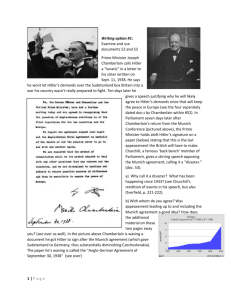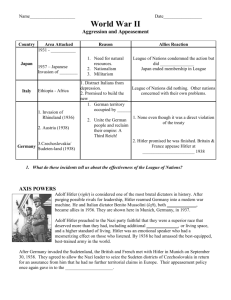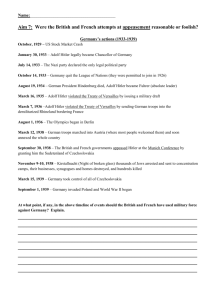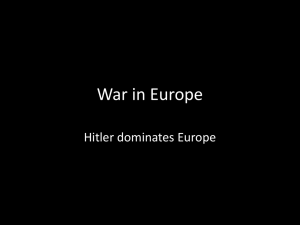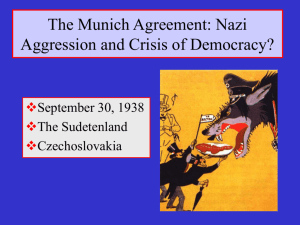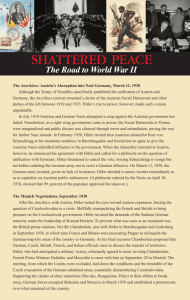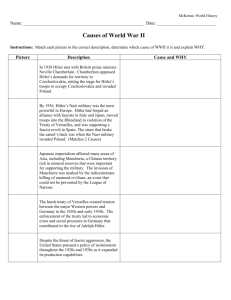Student Worksheet
advertisement
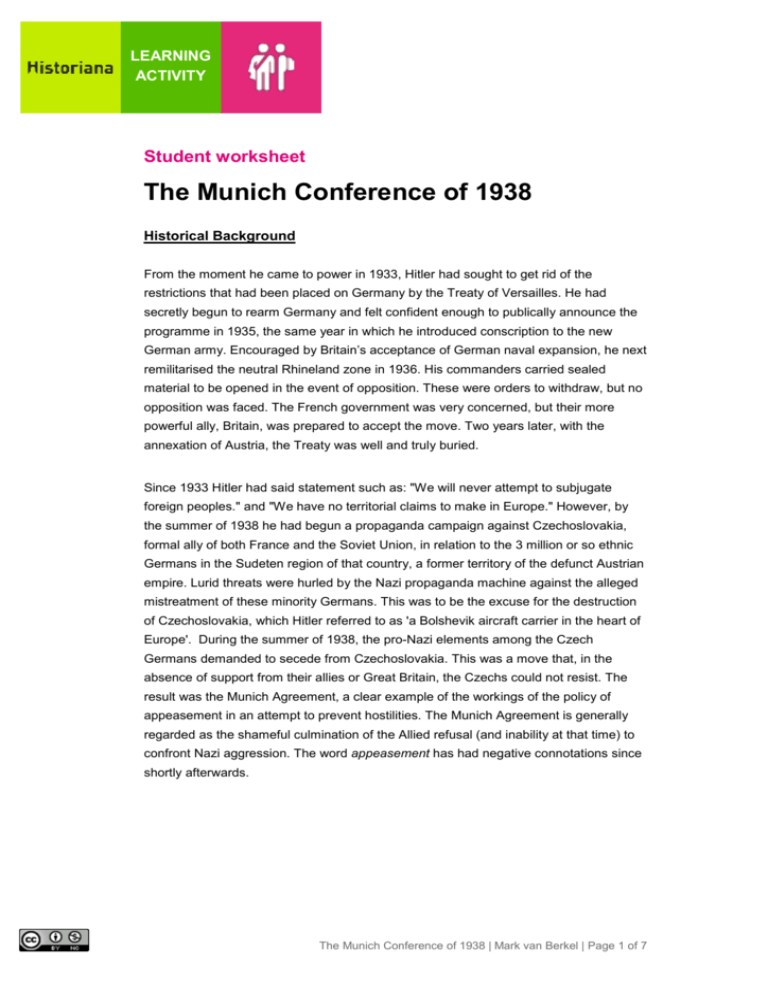
LEARNING ACTIVITY Student worksheet The Munich Conference of 1938 Historical Background From the moment he came to power in 1933, Hitler had sought to get rid of the restrictions that had been placed on Germany by the Treaty of Versailles. He had secretly begun to rearm Germany and felt confident enough to publically announce the programme in 1935, the same year in which he introduced conscription to the new German army. Encouraged by Britain’s acceptance of German naval expansion, he next remilitarised the neutral Rhineland zone in 1936. His commanders carried sealed material to be opened in the event of opposition. These were orders to withdraw, but no opposition was faced. The French government was very concerned, but their more powerful ally, Britain, was prepared to accept the move. Two years later, with the annexation of Austria, the Treaty was well and truly buried. Since 1933 Hitler had said statement such as: "We will never attempt to subjugate foreign peoples." and "We have no territorial claims to make in Europe." However, by the summer of 1938 he had begun a propaganda campaign against Czechoslovakia, formal ally of both France and the Soviet Union, in relation to the 3 million or so ethnic Germans in the Sudeten region of that country, a former territory of the defunct Austrian empire. Lurid threats were hurled by the Nazi propaganda machine against the alleged mistreatment of these minority Germans. This was to be the excuse for the destruction of Czechoslovakia, which Hitler referred to as 'a Bolshevik aircraft carrier in the heart of Europe'. During the summer of 1938, the pro-Nazi elements among the Czech Germans demanded to secede from Czechoslovakia. This was a move that, in the absence of support from their allies or Great Britain, the Czechs could not resist. The result was the Munich Agreement, a clear example of the workings of the policy of appeasement in an attempt to prevent hostilities. The Munich Agreement is generally regarded as the shameful culmination of the Allied refusal (and inability at that time) to confront Nazi aggression. The word appeasement has had negative connotations since shortly afterwards. The Munich Conference of 1938 | Mark van Berkel | Page 1 of 7 LEARNING ACTIVITY Source Material Source 1: In British political circles there was a feeling that the Germans had been treated unfairly at the end of the Great War. There was a strong pacifist movement and a near universal desire to avoid another world war. Chamberlain, along with most of the political elite, believed that by befriending Hitler's Germany (rather than antagonising it) and negotiating German expansion (rather than opposing it) not only would another potentially devastating war with Germany be prevented, but a powerful new ally in the struggle against Communist expansion would be gained. Chamberlain's attitude towards Hitler resonates with Roosevelt's approach to Stalin. The policy that emerged was called appeasement. (David Carlton) Source 2: Agreement reached on September 29, 1938, between Germany, the United Kingdom, France, and Italy Germany, the United Kingdom, France, and Italy, taking into consideration the agreement, which has been already reached in principle for the cession to Germany of the Sudeten German territory, have agreed on the following terms and conditions governing the said cession and the measures consequent thereon, and by this agreement they each hold themselves responsible for the steps necessary to secure its fulfillment. 1) The evacuation will begin on October lst. 2) The United Kingdom, France, and Italy agree that the evacuation of the territory shall be completed by October 10th, without any existing installations having been destroyed, and that the Czechoslovak Government will be held responsible for carrying out the evacuation without damage to the said installations. 3) The conditions governing the evacuation will be laid down in detail by an international commission composed of representatives of Germany, the United Kingdom, France, Italy, and Czechoslovakia. 4) The occupation by stages of the predominantly German territory by German troops will begin on October 1st. The four territories marked on the attached map will be occupied by German troops in the following order: the territory marked number I on the 1st and 2d of October, the territory marked number II on the 2d and 3d of October, the territory marked number III on the 3d, 4th, and 5th of October, the territory marked number IV on the 6th and 7th of October. The remaining territory of preponderantly German character will be ascertained by the aforesaid international commission forthwith and be occupied by German troops by the 10th of October. 5) The international commission referred to in paragraph 3 will determine the territories in which a plebiscite is to be held. These territories will be occupied by international bodies until the plebiscite has been completed. The same commission will fix the conditions in which the plebiscite is to be held, taking as a basis the conditions of the Saar [territory ceded to France by the treaty of Versailles for 15 years; returned to Germany in 1935] plebiscite. The commission will also fix a date, not later than the end of November, on which the plebiscite will be held. The Munich Conference of 1938 | Mark van Berkel | Page 2 of 7 LEARNING ACTIVITY 6) The final determination of the frontiers will be carried out by the international commission. This commission will also be entitled to recommend to the four Powers, Germany, the United Kingdom, France, and Italy, in certain exceptional cases, minor modifications in the strictly ethnographical determination of the zones which are to be transferred without plebiscite. 7) There will be a right of option into and out of the transferred territories, the option to be exercised within 6 months from the date of this agreement. A German-Czechoslovak commission shall determine the details of the option, consider ways of facilitating the transfer of population and settle questions of principle arising out of the said transfer. 8) The Czechoslovak Government will, within a period of 4 weeks from the date of this agreement, release from their military and police forces any Sudeten Germans who may wish to be released, and the Czechoslovak Government will within the same period release Sudeten German prisoners who are serving terms of imprisonment for political offenses. Adolf Hitler Ed. Daladier Mussolini Neville Chamberlain Munich, September 29, 1938 Source 3: Annex to the Agreement His Majesty's Government in the United Kingdom and the French Government have entered into the above agreement on the basis that they stand by the offer, contained in paragraph 6 of the Anglo-French proposals of September 19th, relating to an international guarantee of the new boundaries of the Czechoslovak State against unprovoked aggression. When the question of the Polish and Hungarian minorities in Czechoslovakia has been settled, Germany and Italy for their part will give a guarantee to Czechoslovakia. (Munich, September 29, 1938) Source 4: Fascist Italy and its dictatorial leader Benito Mussolini were relatively sympathetic to the ascent of Nazi Germany by 1938. This was a significant turnaround from 1934 when the Italian government ordered a partial mobilization to prevent an Austrian Anschluss, orchestrated by Nazi sympathizers. Fascist Italy's military adventure in Ethiopia during 1935-36 (the Abyssinian Affair) has generally been viewed as the event that alienated Italy from Britain and France. From that time onward, Nazi efforts to court Italian friendship proved more fruitful. Source 5: Perhaps the most bellicose of the great powers in 1938 was the Soviet Union, led by Joseph Stalin. It viewed the rise of Nazi Germany with great concern and endeavored to create an anti-Nazi coalition during the period leading up to the Sudeten crisis. It declared a willingness to assist Czechoslovakia and go to war with the Third Reich, provided that either Poland or Rumania allowed the Red Army transit rights through their territory and Britain and France also went to war. This offer was received with suspicion from all quarters. However, Poles and Rumanians doubted the Red Army The Munich Conference of 1938 | Mark van Berkel | Page 3 of 7 LEARNING ACTIVITY would ever leave their territory if they allowed it entry and therefore refused to give it transit rights, the offer proved to be irrelevant to resolving the crisis. Source 6: An earlier statement would not have been possible when I was flying backwards and forwards across Europe, and the position was changing from hour to hour. But to-day there is a lull for a brief time, and I want to say a few words to you, men and women of Britain and the Empire, and perhaps to others as well. First of all I must say something to those who have written to my wife or myself in these last weeks to tell us of their gratitude for my efforts and to assure us of their prayers for my success. Most of these letters have come from women - mothers or sisters of our own countrymen. But there are countless others besides - from France, from Belgium, from Italy, and even from Germany, and it has been heartbreaking to read the growing anxiety they reveal and their intense relief when they thought, too soon, that the danger of war was past. I can well understand the reasons why the Czech Government have felt unable to accept the terms which have been put before them in the German memorandum. Yet I believe after my talks with Herr Hitler that, if only time were allowed, it ought to be possible for the arrangements for transferring the territory that the Czech Government has agreed to give to Germany to be settled by agreement under conditions which would assure fair treatment to the population concerned. You know already that I have done all that one man can do to compose this quarrel. After my visits to Germany I have realized vividly how Herr Hitler feels that he must champion other Germans, and his indignation that grievances have not been met before this. He told me privately, and last night he repeated publicly, that after this Sudeten German question is settled, that is the end of Germany's territorial claims in Europe. After my first visit to Berchtesgaden I did get the assent of the Czech Government to proposals which gave the substance of what Herr Hitler wanted and I was taken completely by surprise when I got back to Germany and found that he insisted that the territory should be handed over to him immediately, and immediately occupied by German troops without previous arrangements for safeguarding the people within the territory who were not Germans, or did not want to join the German Reich. I must say that I find this attitude unreasonable. If it arises out of any doubts that Herr Hitler feels about the intentions of the Czech Government to carry out their promises and hand over the territory, I have offered on part of the British Government to guarantee their words, and I am sure the value of our promise will not be underrated anywhere. However much we may sympathise with a small nation confronted by a big and powerful neighbor, we cannot in all circumstances undertake to involve the whole British Empire in war simply on her account. If we have to fight it must be on larger issues than that. I am myself a man of peace to the depths of my soul. Armed conflict between nations is a nightmare to me; but if I were convinced that any nation had made up its mind to dominate the world by fear of its force, I should feel that it must be resisted. Under such a domination life for people who believe in liberty would not be worth living; but war is a fearful thing, and we must be very clear, before we embark on it, that it is The Munich Conference of 1938 | Mark van Berkel | Page 4 of 7 LEARNING ACTIVITY really the great issues that are at stake, and that the call to risk everything in their defense, when all the consequences are weighed, is irresistible. For the present I ask you to wait as calmly as you can the events of the next few days. As long as war has not begun, there is always hope that it may be prevented, and you know that I am going to work for peace to the last moment. Good night. (N. Chamberlain) Source 7: The following is the wording of a printed statement that Neville Chamberlain waved as he stepped off the plane on 30 September, 1938 after the Munich Conference had ended the day before: "We, the German Führer and Chancellor, and the British Prime Minister, have had a further meeting today and are agreed in recognizing that the question of Anglo-German relations is of the first importance for our two countries and for Europe. We regard the agreement signed last night and the Anglo-German Naval Agreement as symbolic of the desire of our two peoples never to go to war with one another again. We are resolved that the method of consultation shall be the method adopted to deal with any other questions that may concern our two countries, and we are determined to continue our efforts to remove possible sources of difference, and thus to contribute to assure the peace of Europe." Chamberlain read the above statement in front of 10 Downing St. and said: "My good friends, for the second time in our history, a British Prime Minister has returned from Germany bringing peace with honour. I believe it is peace for our time... Go home and get a nice quiet sleep." Source 8: Mussolini had imperial designs on Tunisia, and had some support in that country. In April 1939 with world focus on Hitler's invasion of Czechoslovakia, looking to restore honor from a much older defeat Italy invaded Albania. Italy defeated Albania within just five days forcing king Zog to flee, setting up a period of Albania under Italy. Until May 1939, the Axis had not been entirely official, however during that month the Pact of Steel treaty was made outlining the "friendship and alliance" between Germany and Italy, signed by each of its foreign ministers. Italy's king Victor Emanuel III was also wary of the pact, favoring the more traditional Italian allies like France. Hitler was intent on invading Poland, though Galeazzo Ciano warned this would likely lead to war with the Allies. Hitler dismissed Ciano's comment, predicting that instead that Britain and the other Western countries would back down, and he suggested that Italy should invade Yugoslavia. The offer was tempting to Mussolini, but at that stage world war would be a disaster for Italy as the armaments situation from building the Italian Empire thus far was lean. Source 9: Daladier believed he saw Hitler's ultimate goals, but as a threat. He told the British in a late April 1938 meeting that Hitler's real aim was to eventually secure "a domination of the Continent in comparison with which the ambitions of Napoleon were feeble." He went on to say "Today it is the turn of Czechoslovakia. Tomorrow it will be the turn of Poland and Romania. When Germany has obtained the oil and wheat it needs, she will The Munich Conference of 1938 | Mark van Berkel | Page 5 of 7 LEARNING ACTIVITY turn on the West. Certainly we must multiply our efforts to avoid war. But that will not be obtained unless Great Britain and France stick together, intervening in Prague for new concessions but declaring at the same time that they will safeguard the independence of Czechoslovakia. If, on the contrary, the Western Powers capitulate again they will only precipitate the war they wish to avoid.". Perhaps discouraged by the arguments of the military and civilian members of the French government regarding their unprepared military and weak financial situation, as well as traumatised by France's bloodbath in the First World War that he was personally a witness to, Daladier ultimately let Chamberlain have his way. On his return to Paris, Daladier, who was expecting a hostile crowd, was acclaimed. He then told his aide: "Ah, les cons!" (Ah, the fools!). Source 10: The Munich Conference of 1938 | Mark van Berkel | Page 6 of 7 LEARNING ACTIVITY Assessment Worksheet Your task is to summarise the public and private views of each of the leaders and to explain the differences between them. Leader Public View Explain the differences Adolf Hitler Benito Mussolini Edouard Deladier Neville Chamberlain The Munich Conference of 1938 | Mark van Berkel | Page 7 of 7
